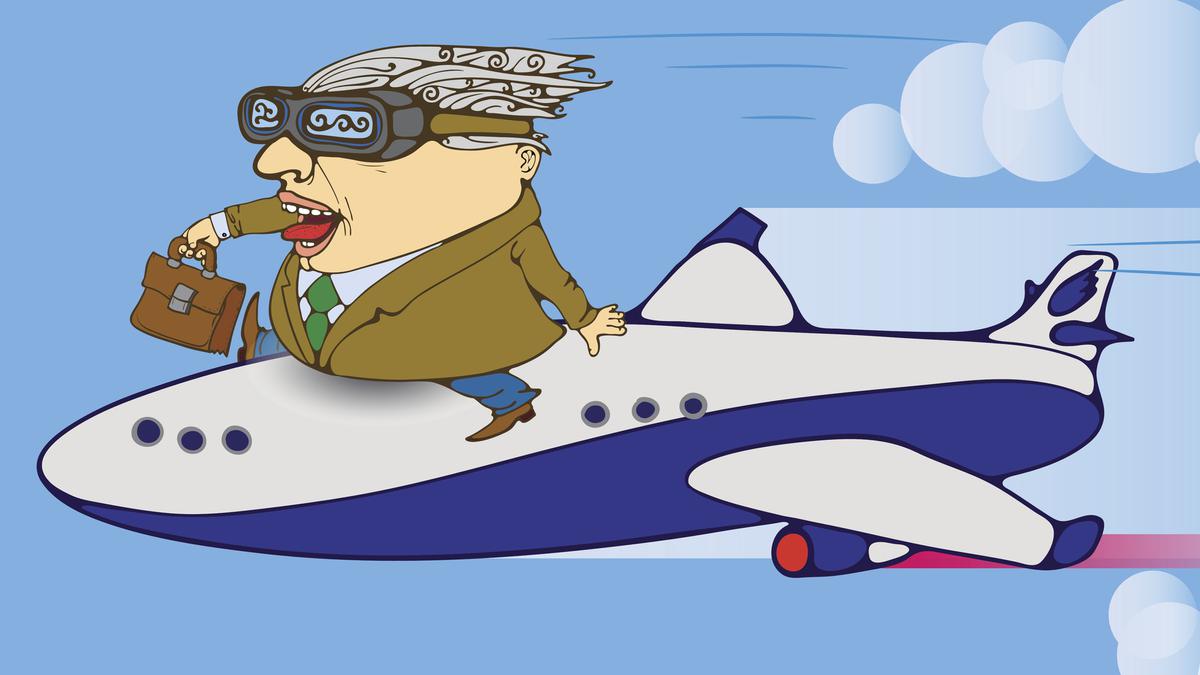
Satire | India’s flexi-airports a la Jamnagar
The Hindu
India's Flexi-Airports to Please the Masters of the Universe Act allows billionaires to turn any airport international temporarily.
Nobody believed me when I said it, and I’ve been saying it for years. I said, “India is the only country in the world where a businessman — no matter how wealthy — can request the government to turn any airport into an international airport for 10 days, and the government will say, ‘Yes, boss!’” And not just say it, but do it. Today the whole world knows this to be true.
Industrialist friends who laughed at me are now messaging me to ask how to go about it. I tell them to just read the papers. In fact, as I had myself reported aeons ago when working for the Guruvayur Guardian, it was the UPA government that framed the enabling legislation.
People with working memories might remember the infamous winter a decade or so ago, when thousands of farmers and workers from all over the country gathered at the Singhu border to protest against the government’s anti-billionaire laws — laws such as MGNREGA, Food Security Act, and the Right to Education Act. After months of stand-off, the government had no choice but to bow down before the working classes’ utter solidarity with the nation’s tiniest and most endangered minority: its billionaires. To appease the protesters, and as a concrete gesture to assure them that they too loved oligarchs as much as any other government, it finally passed the Flexi-Airports to Please the Masters of the Universe Act, 2013 (FAPMUA).
Like with other brilliant initiatives such as UAPA and GST, although the FAPMUA was hurriedly brought in by the Congress, it did precious little with it. It wasn’t until the advent of Amrit Kaal that the legislation would take off, which it finally did at the Jamnagar airport recently. Anyway, for those interested, this is how it works.
Let’s say you are Mr. Dhandapani, CMD of Dhandapani Industries, and you are planning your son’s wedding celebrations at a pristine nature reserve near Tawang. Your guest list includes international luminaries like Harvey Weinstein, Tim Jong Un, first cousin of Kim Jong Un, Jane Epstein, sister of Jeffrey Epstein, and Harry Pot, great-grandson of Pol Pot. All busy people who move around with high security in their own luxury jets. You can’t bundle them all into one bus like some assorted Bollywood Kapoors. To complicate matters, Tawang only has a defence airport, and it’s a sensitive one, given the proximity to the China border. So what do you do?
It’s simple. You pick up the phone and dial your contact in the regime — the guy who got you out of trouble every time you got a call from the ED or IT department, the guy who told you how many crores worth of electoral bonds you needed to buy. Let’s say his name is Bhai. You tell Bhai your requirements.
“Hello Bhai, Dhandapani this side. I’m hearing GDP is growing at 8.4% and you guys are returning with 500-plus! Congratulations!”

The Karnataka government has drafted a comprehensive master plan for the integrated development of Kukke Subrahmanya temple, the State’s highest revenue-generating temple managed by the Hindu Religious Institutions and Charitable Endowments Department. The redevelopment initiative is estimated to cost around ₹254 crore and aims to enhance infrastructure and facilities for devotees.












